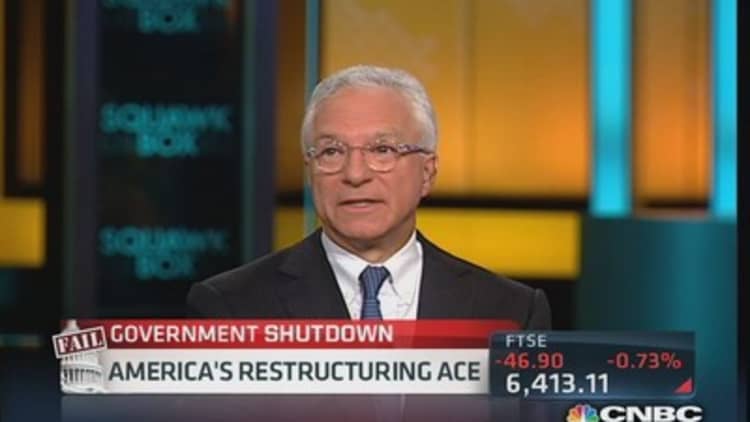
If the U.S. hits the debt ceiling and defaults on its obligations, it would be catastrophic not only domestically but around the world, said Erskine Bowles, former co-chair of the president's bipartisan debt commission and co-founder of the Campaign to Fix the Debt.
"We need to get through these man-made crises" and get to the real issues of reducing the nation's debt, he said Wednesday on CNBC's "Squawk Box." Bowles—also White House chief of staff under President Bill Clinton—spoke on the second day of the government shutdown and a couple weeks until the debt ceiling deadline.
"This shutdown is bad. It's painful. It does hurt some people. It costs the taxpayers some real money. But it's not catastrophic. We hit this debt ceiling, That's catastrophic," Bowles said.
The Treasury has already started to use its last tools for pushing back the day when the government will run out of its legal borrowing authority. By Oct. 17, the $16.7 trillion debt limit will be reached, leaving about $30 billion in cash to pay the nation's bills.
(Read more: Treasury starts last steps to keep borrowing authority)
In the summer of 2011, budget talks between Republican leaders and President Barack Obama came close to forcing a Treasury default, which cost the U.S. its Triple-A credit rating—tanking the financial markets.
"There are plenty of people across the aisle, especially in the Senate, that are constantly talking to each other, trying to figure out how we can get past this ultra-partisianship," said Bowles.
The cost of the first government shutdown in 17 years is running about $12.5 million an hour or $300 million a day, according to economic-consulting firm IHS Global Insight. Some 800,000 nonessential federal workers are being furloughed, with the impact starting to have a ripple in the government contracting world.
(Read more: Shutdown may hit private-sector workers next week)
As the standoff over tying the funding of the government to a one-year delay of Obamacare continues, the shutdown fight could bleed into the upcoming debt ceiling debate.

Obama has said he's not budging on health care, "and so if Republicans say 'defeating it is our signature achievement, the Republican party is dead without it's defeat,'" said Jim Millstein, former chief restructuring officer at the U.S. Treasury under Obama. "I think the country is in a huge crisis."
Take Obamacare off the table, Millstein argued, "You would have thought that leaders of the Republican Party would have declared victory on the budget. The continuing resolution is a rollover of 2012."
"Yes, it had some tax increases, but it had significant spending cuts, a Republican priority," the chairman and CEO Millstein & Co. continued. "They won on that."
Since the president's debt commission released its final report in December 2010, Bowles said, "we've done the easy stuff" like raising taxes on wealthier Americans and putting a cap on discretionary spending,
"We've done the stupid stuff. You don't get much stupider than the sequester," he added—warning the "tough stuff" remains untouched such as reforming entitlements, making Social Security solvent, and overhauling the tax code.
—By CNBC's Matthew J. Belvedere. Follow him on Twitter @Matt_SquawkCNBC.


